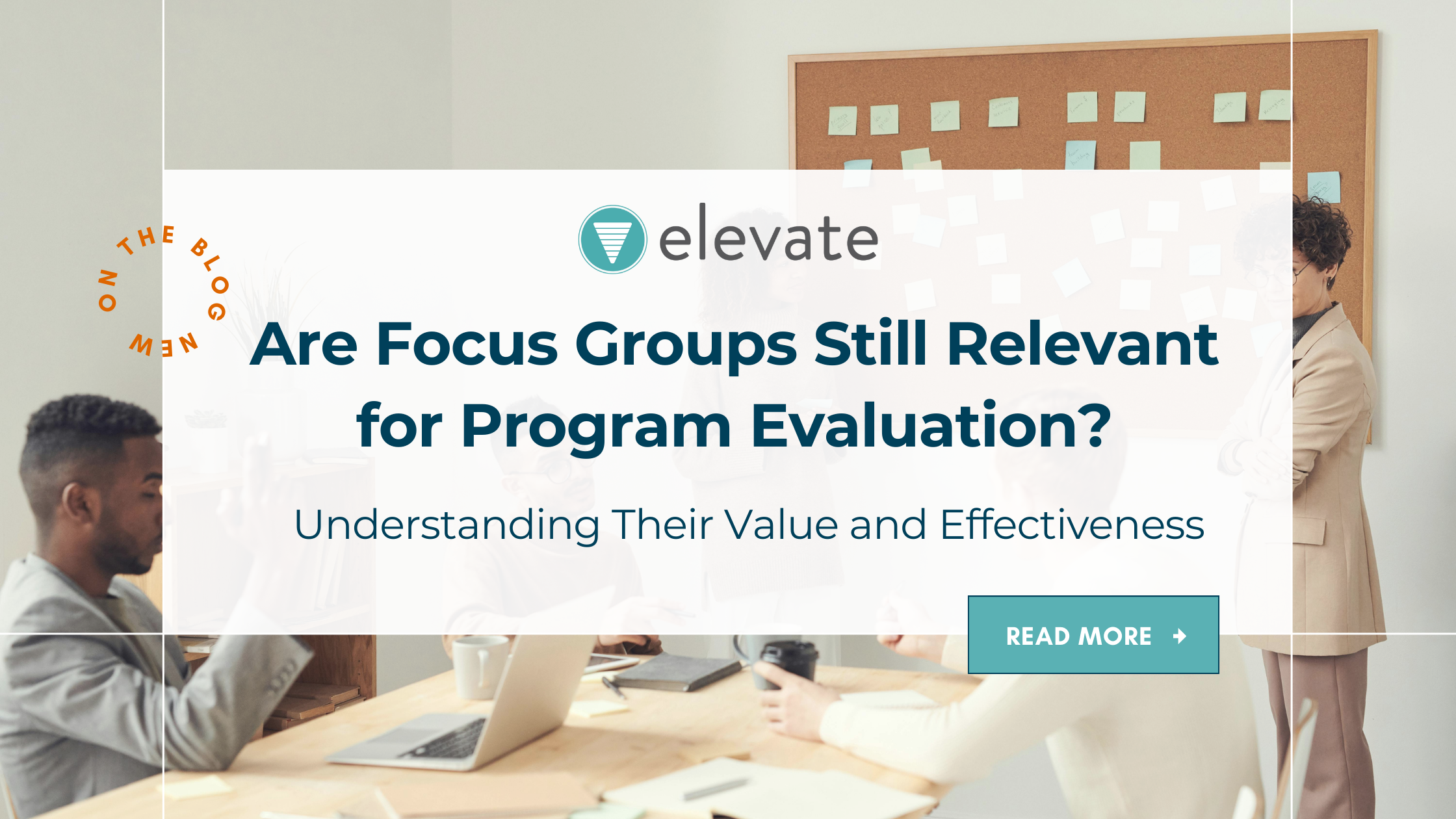Are Focus Groups Still Relevant in Program Evaluation? Understanding Their Value and Effectiveness
Written by Alyssa Reynolds
In the ever-evolving landscape of program evaluation, focus groups have long been a staple for gathering qualitative insights. As we navigate a world filled with digital distractions and shifting preferences, the question arises: Are focus groups still an effective tool for program evaluation? Let’s explore what focus groups are, when they should be used in program evaluation, and their current effectiveness. If you’re struggling with focus group engagement, we will cover some strategies to address that as well.
What Are Focus Groups?
Focus groups are guided discussions with a small group of participants facilitated by a moderator. Focus groups are used across multiple sectors like marketing, user experience, social sciences, and evaluation. The purpose is to delve into participants' attitudes, experiences, and feedback on specific program elements. Unlike surveys, which yield quantitative data, focus groups provide a depth of understanding through qualitative feedback, offering a nuanced view of how programs impact participants and stakeholders (Krueger & Casey, 2015). At Elevate, we think of quantitative data as providing breadth while qualitative data provides depth.
Focus Group Barriers and Obstacles
Despite their long-standing use, focus groups face several contemporary challenges in program evaluation. At Elevate, we have noticed it is getting increasingly difficult to get folks in a room for a focus group. If you have experienced similar challenges, the following reasons may provide some insight.
Increased Competition for Attention: We live in the digital age. That means people are constantly bombarded with digital content and increasing demands on their time. Capturing folks' attention in general has become more difficult, and the same is true when it comes to focus groups. One article argues that participants may also be overwhelmed with commitments and may prioritize other activities over focus group participation (McKeown & Thomas, 2013). In other words, folks have better things to do!
Changing Communication Preferences: The shift towards digital communication means that traditional recruitment methods for focus groups might not be as effective with certain populations. Evaluators need to adapt by considering their audience when choosing a recruitment strategy and leveraging digital channels to engage participants when necessary (Pew Research Center, 2021).
Decreased Trust in Research: Growing concerns about privacy and data use can make people hesitant to participate in research activities. Building and maintaining trust is essential to ensure meaningful participation in focus groups (Gallup, 2021).
Logistical and Practical Barriers: The necessity for participants to be physically present or adhere to specific schedules can limit participation. Offering virtual or flexible options can help address these logistical challenges (Weller et al., 2018).
Difficulty in Finding the Right Participants: Identifying and recruiting participants who accurately represent the program’s target audience can be challenging. Effective screening and targeted recruitment strategies are crucial for obtaining relevant feedback (Stewart & Shamdasani, 2015).
Strategies to Overcome These Challenges
In order to mitigate or avoid the challenges above, Elevate has found success using the following strategies:
Adapt Recruitment Channels: Utilize digital platforms and social media to reach potential participants where they are most active, and streamline the recruitment process. However, if you know that your participant population responds best to word-of-mouth invitations, take-home flyers, or your regular newsletter, leverage that insight to reach them.
Enhance Incentives: Offer meaningful incentives to encourage participation and demonstrate appreciation for their time and input. Like we said before, you’ll be competing with a number of other responsibilities and activities in folks’ lives. An incentive should not only catch their attention, but serve to compensate them for their time. Consider that many folks may have to pay for childcare or transportation in order to participate.
Build Trust: Clearly communicate the goals of the focus group and how participant feedback will be used, ensuring confidentiality to foster trust and openness. We have found this to be particularly true with our clients who work in direct service organizations and programs. The more participants trust your organization, the more they will be bought into its success, and the more likely they will feel comfortable and motivated to share their feedback.
Offer Flexibility: Provide options for virtual participation or flexible scheduling to accommodate diverse needs and preferences. Since the pandemic, Elevate has seen success in offering virtual focus group options. Whether it’s because of concerns for their health, transportation barriers, Nashville traffic, expensive childcare, or some other reason, allowing folks to participate from home tends to increase participation rates as compared to groups only offered in person.
Engage Participants Early: Foster engagement from the outset to build commitment and ensure high-quality feedback. In addition to building trust in ongoing ways, make sure you get on folks’ calendars before they are booked up! We have found that a two-week rule between the initial invite and focus group date works well in most cases, but some populations may require even further notice to be able to adjust their schedules.
Conclusion
So what do we make of all this? Ultimately, we still believe there is great value in getting folks in a room and hearing from them first-hand, in their own words, about their opinions and experiences. And while nothing quite compares to gathering face-to-face, we have found that rich and meaningful conversations can still happen in a virtual space. Focus groups continue to be a valuable tool in program evaluation, offering deep, qualitative insights that can stand alone or serve to complement quantitative data in a mixed-methods approach. Despite the existing challenges, you can conduct successful focus groups if you remain adaptive and pay attention to what your participants want and need.
References:
Gallup. (2021). "Trust in Institutions." Retrieved from Gallup
McKeown, B., & Thomas, D. (2013). Quantitative Approaches to Social Research. Routledge.
Pew Research Center. (2021). "Social Media Use in 2021." Retrieved from Pew Research Center
Stewart, D.W., & Shamdasani, P.N. (2015). Focus Groups: Theory and Practice. Sage Publications.
Weller, S.C., et al. (2018). The Craft of Research. University of Chicago Press.


